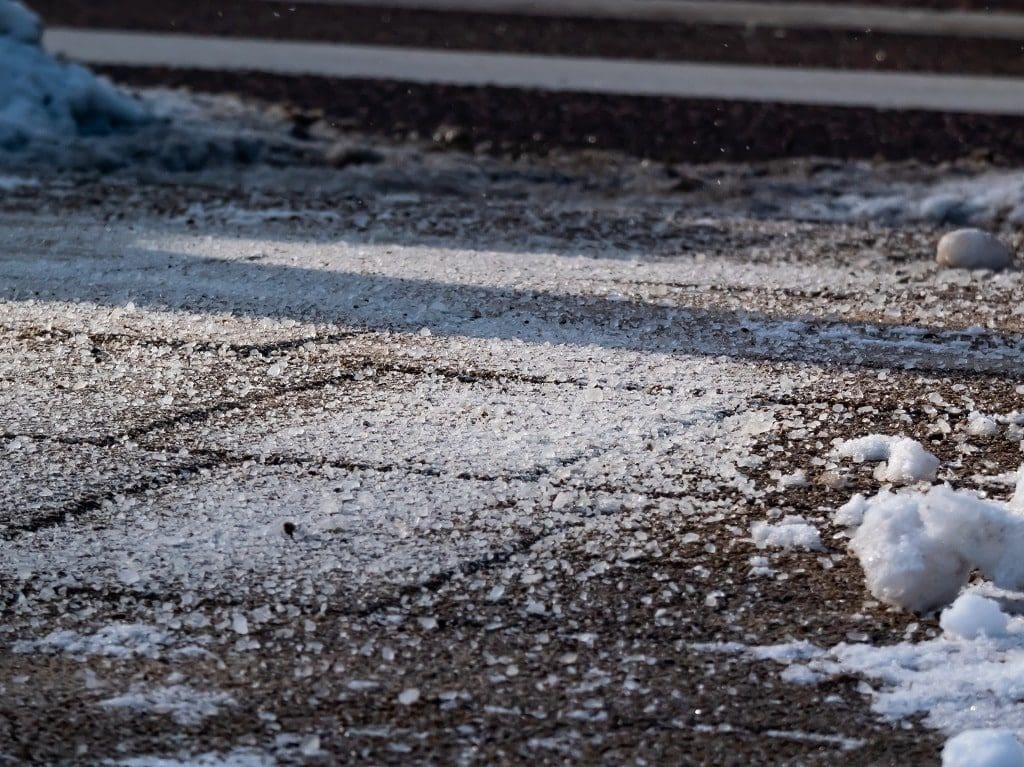One of the many winter challenges facing commercial and residential property owners with lawns is finding a deicer that doesn’t cause damage and kill plants. A safe deicer is a miracle for Wisconsin and Minnesota properties that experience harsh winters, allowing property owners to keep driveways and walkways free from ice and safe to use without risking a chemical or salt brine runoff that penetrates the soil and kills plants.
At Earth Development, we help property owners stay on top of their deicing and snow removal needs with local teams of experts. We also provide online resources to show you how to melt ice on grass without causing damage.
Choosing a Safe Deicer for Lawns and Plants

Let’s start with some tips on finding an ice melt safe for grass, and various non-chemical ice melt options. Then we’ll explore some of our top tips for removing ice from your lawn without killing your grass, plants, and trees.
Rock Salt
Rock salt, also known by its scientific name sodium chloride, is the most common form of deicing agent used by professionals. It’s what is often used on the roads, it is applied to driveways parking lots, and it can even be used on walkways to reduce ice build-up. It works by lowering the freezing temperature of the water, but it can cause damage to plants.
Does salt kill grass? You bet. When water mixes with salt it forms a brine, and this brine easily finds its way into the soil surrounding the parking lot, driveway, or pavement. At Earth Development we recommend using salt only on surfaces not adjacent to grass or plants and landscaping.
Calcium Chloride
Calcium chloride is perhaps the next best ice melt option. It works more quickly than rock salt does and at colder temperatures, too, but it may cost a little more.
The benefit of this deicing agent is that it is not corrosive to your concrete surfaces and driveways, but it is still damaging to your laws and plants.
Potassium Chloride
Potassium chloride, sometimes known as “potash” but perhaps best known as plant fertilizer, is safe for plants when used in moderation and applied professionally. It also works as a deicing agent on a variety of surfaces.
So if you’re curious what fertilizer melts ice, this is it. It’s more effective and safer than the above two options, but it does take longer to work – meaning it’s important to have commercial snow removal experts apply this substance to your outdoor surfaces before the bad weather arrives.
Calcium Magnesium Acetate (CMA)
Calcium Magnesium Acetate is a newer deicing agent that is widely used by those looking to prevent harm to plants and lawns. The agent is more expensive than traditional rock salt and is less toxic to plants and grass.
It is often used as a fertilizer for plants and works by creating heat when it is dissolved in water. It literally melts the ice away and is effective at temperatures as low as 20 degrees F.
Eco-Friendly Deicers
There are also many eco-friendly deicers for plants and lawns, including some eco-friendly methods of shoveling snow. Sometimes the best way to remove snow from your lawn without causing damage is using a shovel.
For those looking for eco-friendly ways to make surfaces grippier and safer to walk on, consider using natural agents like beet juice, birdseed, clay cat litter, and alfalfa meal.
Best Tips for Plant-Safe Ice Melting

On top of choosing the right safe ice melt, and an alternative to rock salt for plants, there are some important things to consider that will help you prevent damage to your lawns:
These include:
Use Less Deicer
If you simply can’t avoid using rock salt, try using less of it. Using a small amount is often sufficient as once the melting process has started, it will spread. As salt mixes with water, it forms a brine that more easily spreads across your surfaces.
Over time, add small amounts until you achieve a maximum melt with minimum product use.
Apply Deicer Before the Weather Turns
Applying a deicer before the snowfall arrives or before the temperature drops below freezing means you’re less likely to experience ice build-up in the first place, meaning you won’t need to apply huge amounts of deicing agents that risk causing damage to your lawn.
Try Liquid Deicers
There are many liquid deicers to choose from that achieve good results without much product. Many local authorities across the United States have begun using liquid deicers and brines on the roads as they produce a level of melt that is usually achieved with larger quantities of dry salt. Liquid deicers are an instant brine, triggering the melting process more quickly.
Get Professional Advice Today
Still not sure what de-icing products are right for you? Don’t worry. Earth Development has teams of local snow removal specialists available across the Midwest ready to help you decide.
To find out more about the range of products we use, and how our local professional can help you protect your lawn this winter, call Earth Development today!
